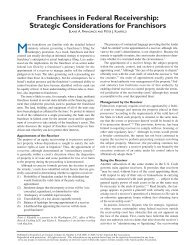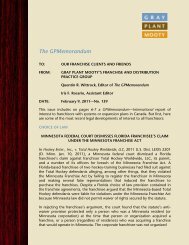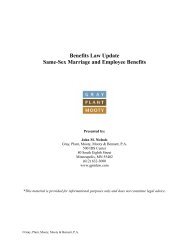Los Angeles Lawyer October 2008 - Gray Plant Mooty
Los Angeles Lawyer October 2008 - Gray Plant Mooty
Los Angeles Lawyer October 2008 - Gray Plant Mooty
Create successful ePaper yourself
Turn your PDF publications into a flip-book with our unique Google optimized e-Paper software.
Elimination of<br />
BY SABRINA A. BELDNER<br />
STATE<br />
OF THE<br />
UNION<br />
With In re Marriage Cases, the California Supreme Court<br />
legalized gay marriage in California, but it did not<br />
invalidate California's existing domestic partnership law<br />
IN MAY, same-sex couples obtained the<br />
legal right to marry in California as a result<br />
of In re Marriage Cases. 1 The decision is<br />
widely considered to be a big step, but legally<br />
it simply bestowed the highly prized term<br />
“marriage” upon a type of union that had<br />
previously developed over the last decade,<br />
under a statutory scheme known as a “registered<br />
domestic partnership,” into the functional<br />
equivalent of marriage. While gay marriage<br />
has only recently become legal in<br />
California, domestic partnership law has a<br />
longer history.<br />
In 1999, the Domestic Partner Registration<br />
Act was enacted by the state legislature, establishing<br />
a statewide registry for domestic partners.<br />
While stopping short of affording gay<br />
and lesbian unions the prized nomenclature<br />
and the full range of legal rights and obligations<br />
associated with marriage, the Domestic<br />
Partner Registration Act bestowed basic legal<br />
recognition, rights, and obligations on domestic<br />
partner registrants. A “domestic partnership”<br />
was defined as “two adults who have<br />
chosen to share one another’s lives in an intimate<br />
and committed relationship of mutual<br />
caring.” 2 To form a valid domestic partnership<br />
today, two parties are required to:<br />
• Have a common residence. 3<br />
• Be unmarried and not be members of<br />
another domestic partnership. 4<br />
• Not be related by blood to the extent that<br />
the parties would be prevented from being<br />
married to each other in this state. 5<br />
• Each be at least 18 years old. 6<br />
• Be either of the same sex or over 62 years<br />
of age and eligible for social security benefits. 7<br />
• Be capable of consent. 8<br />
The Domestic Partnership Registration<br />
Act initially established procedural mecha-<br />
Sabrina A. Beldner is an associate in the <strong>Los</strong><br />
<strong>Angeles</strong> office of McGuireWoods LLP. Her practice<br />
includes representation of employers and management<br />
in employment litigation.<br />
KEN CORRAL<br />
18 <strong>Los</strong> <strong>Angeles</strong> <strong>Lawyer</strong> <strong>October</strong> <strong>2008</strong>







